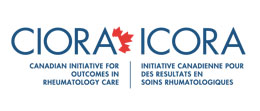Summer 2014 (Volume 24, Number 2)
CIORA: Research Successes and Future Directions
By Boulos Haraoui, MD, FRCPC
Download PDF
The Canadian Initiative in Outcomes of Rheumatology Care (CIORA) was created seven years ago to help support clinical research in rheumatology. It started as an initiative between Abbott and a group of core CRA members. It was based on the results of a survey of the CRA membership regarding the unmet need of funding small, clinically relevant projects. Indeed, no such structure existed; the only agencies one could apply to for research grants were the Canadian Institutes for Health Research (CIHR) and The Arthritis Society (TAS). The focus was on early access to rheumatology care, patient awareness, education, and multi-disciplinary approaches.
During the first three years, CIORA operated under an unrestricted grant from Abbott, which allowed the funding of several projects. With the huge success and the set-up of a CIHR-like review process under the guidance of Dr. John Esdaile, the CIORA steering committee decided to expand funding by enlisting other pharmaceutical companies. Currently, CIORA receives unrestricted funding from Abbvie, Amgen, BMS, Pfizer, Janssen, Roche, and UCB.
Three years ago, CIORA moved under the auspices of the CRA and became an official committee, managing a yearly budget of almost one million dollars. The yearly call for grant applications was completed last month and 24 projects were submitted; they are presently being assessed by a group of independent scientists and clinicians. The results were announced in mid-May.

Last year CIORA was able to fund 11 one-year and two-year projects. It also introduced the CRA(CIORA)/TAS Clinician Investigator Award in order to help young promising investigators start their career; it is managed by TAS. The first award was given to Dr. Cheryl Barnabe from the University of Calgary for her project entitled “Service Delivery Models for Triage and Targeted Treatment to Improve Patient and Health System Outcomes in Rheumatoid Arthritis”.
The success of CIORA can also be measured over the years by the several oral and poster presentations of funded research projects at various medical meetings and conferences, as well as publications in peer-reviewed journals. You can view the listing by visiting the CRA website and clicking on the CIORA header (www.rheum.ca/en/ciora/).
CIORA still needs to grow in order to better fulfil one key component of the CRA’s mission, namely research. While the topics eligible for funding were initially restricted to inflammatory arthritis (IA), we recognize the need to address the broader spectrum of diseases managed by rheumatologists. Efforts will be deployed in the coming years to broaden the sources of funding, and collaborations will be sought with other organizations similar to our partnership with TAS.
I would like to acknowledge the tremendous administrative work done by the CRA staff, in particular Christine Charnock and Virginia Hopkins. I would like also to highlight the hard work of the Steering Committee members, Dr. Janet Pope, Dr. Carter Thorne, Dr. Michel Zummer, Dr. Alf Cividino, Dr. Maggie Larché, Dr. Regina Taylor-Gjevre, and Dr. Jamie Henderson. Finally, special thanks and gratitude to Dr. John Esdaile and all the reviewers who volunteer their time and expertise to this important task.
Boulos Haraoui, MD, FRCPC
Associate Professor of Medicine,
Université de Montréal
Head,
Clinical Research Unit in Rheumatology,
Centre hospitalier de l'Université de Montréal (CHUM)
Chair,
CIORA Steering Committee
Montreal, Quebec
|



